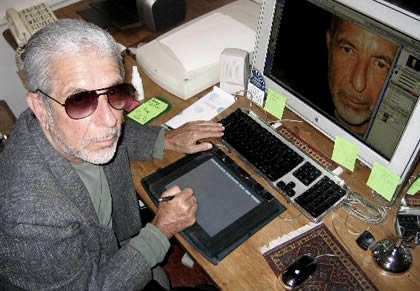
DEAR HEATHER (Columbia/Sony) • Leonard Cohen
I've been listening to Dear Heather, Leonard Cohen's latest studio album, and reading about haiku, so bear with me here. It seems that what we in the West have come to know as "haiku"--that three-line form of Japanese poetry set in nature and/or commenting on it--evolved as a melding of two other poetic concepts. Haikai, which means "playful," applied to a kind of call and response collaborative poetry involving two or more poets. Hokku referred to the first three lines of the collaborative poem, which were given special prominence and were written by a single poet. In the 1800s the two ideas collapsed into what we call haiku. That's what I learned from my book. What I remember learning from grade school English was that there was an empty space in every haiku, a place where the poet made a leap, which landed you in a different place with a different point of view. The poetry, my teacher said, was in that space.
There's a lot about Dear Heather that makes me think of haiku and its forebears. The title cut is itself like a haiku gone manic from lust. "Dear Heather / Please walk by me again / With a drink in your hand / And your legs all white / From the winter." He repeats the lines over and over, mantra-like, in ever more mechanized tones, even ending up spelling words out. It could drive you mad or it could send you right to the heart of that moment of (human) nature.
The playful spirit of haikai infuses the album, and sometimes it's the idea of playfulness that keeps this album from being confusing. Otherwise the doowop background vocals in Cohen's setting of a gorgeous (and somber) Lord Byron poem, "Go No More A-Roving," might be jarring. Or the nothing-if-not-surprising choice of the Jew's harp to color his meditation on 9-11, "On That Day," could be just plain inexplicable. It's as if Cohen is refusing to be defined by the dark, even as it is his natural habitat. There's a dignified humor in his view of himself, of aging and of human nature, as evidenced in "Because," an observation of women in his later years. "Because of a few songs / Wherein I spoke of their mystery / Women have been / Exceptionally kind to my old age."
There is an ever-developing sense of collaboration in Cohen's work, for better and for worse. He pays tribute and responds to mentors and inspirations throughout the album, much as those Japanese poets might have responded in verse to the lines gone before: there is a powerful sense of lineage and time passing. His own voice reduced to an even huskier, darker version of itself, he seems to be relying more heavily on the other vocalists, sometimes to beautiful effect and sometimes not. There are also times on the album when I think the production choices (made variously by Leane Unger, Sharon Robinson and Anjani Thomas) get in the way of the songs. In any case, Cohen's lyrics cuts through bad synth instruments or odd production and shine darkly.
Dear Heather makes many surprising leaps of the kind my teacher talked about, leading directly to that rotation of perspective. And although some of those leaps seem to miss that empty poetic place altogether, the album is at it's best when it lives in that space. • Judith Edelman
return to covers listen to clips
leonardcohen.com leonardcohenfiles.com